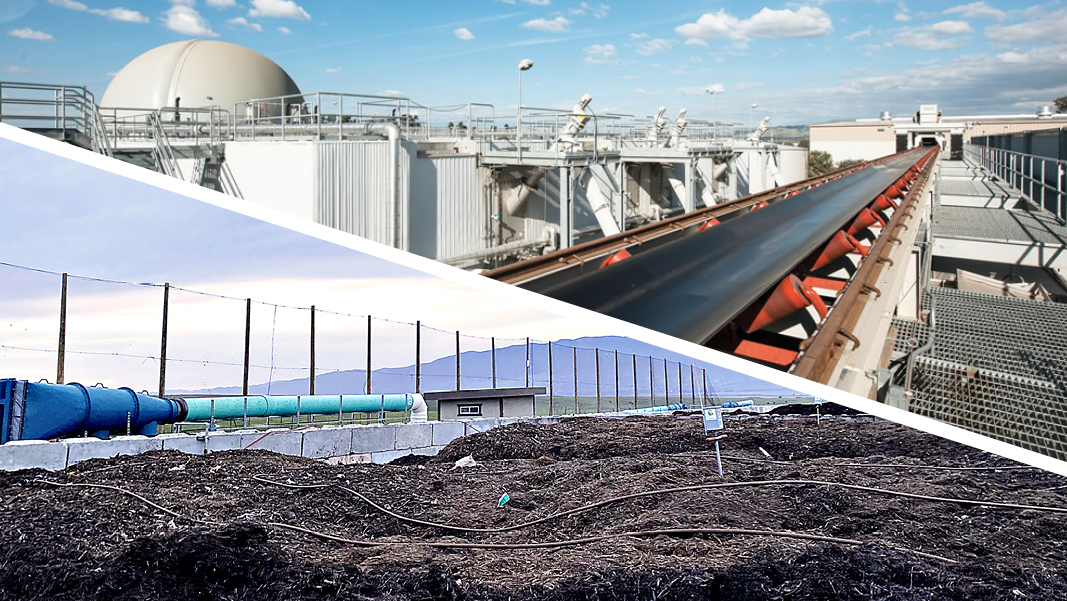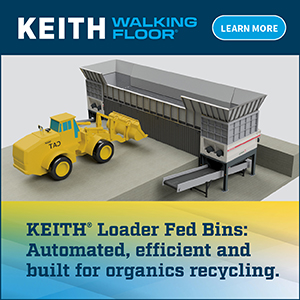Top: CR&R anaerobic digestion facility in Perris, CA (photo courtesy of CR&R Environmental Services). Bottom: New composting facility in Salinas, CA (photo courtesy of Green Mountain Technologies).
The U.S. House of Representatives’ Committee on Energy and Commerce introduced the CLEAN Future Act (H.R. 1512) on March 2, a sweeping piece of legislation designed to achieve net zero greenhouse gas (GHG) pollution no later than 2050, with an interim target of reducing GHG pollution by 50 percent from 2005 levels no later than 2030. CLEAN — Climate Leadership and Environmental Action for our Nation — includes provisions that benefit anaerobic digestion and composting, primarily as tools to reduce methane emissions. “The CLEAN Future Act classifies methane as a ‘Super Pollutant’,” explains Markus Videnieks, Manager of Federal Policy at the American Biogas Council. “It requires the U.S. EPA to establish regulations on state governments that will result in a 90% cut in 2012 methane emission levels by 2030 with an interim goal of 65% by 2025. As part of addressing this concern, the act establishes an EPA grant program for states to construct large-scale composting or anaerobic digestion food waste-to-energy projects.”
The CLEAN Future Act includes a nationwide Clean Electricity Standard (CES) requiring all retail electricity suppliers to obtain 100% clean electricity by 2035, in line with President Biden’s call to action for the power sector. The CES mandates that all retail electricity suppliers provide an increasing supply of clean electricity to consumers starting in 2023, rising to 80% clean by 2030 and then 100% clean by 2035. The bill also invests heavily in clean energy, distributed energy resources, grid infrastructure, and microgrids — all of which build resiliency and are crucial to reducing carbon pollution, notes the Committee.
To remove existing logjams with the Renewable Fuel Standard (RFS) administered by the U.S. EPA, the bill directs the EPA to take action on petitions for renewable fuel pathways if 90 days or more have passed since the date of submission and when the fuel type, production process, and feedstock submitted have been approved for sale in at least one state under a program to reduce the carbon intensity of transportation fuel. This includes petitions related to the “e-RIN” pathway for biogas projects that generate electricity for use in electric vehicles.
The CLEAN Future Act would impose new clean air permitting requirements on industrial facilities that produce plastic, as well as “reform our nation’s outdated recycling and waste management system to ensure that producers minimize the amount of waste they generate, including by establishing postconsumer recycled content standards for everyday products and instituting a national bottle deposit program,” states a press release issued by the Energy & Commerce Committee after the bill was introduced. The Act also establishes programs to invest in community level zero-waste initiatives to improve education and outreach around waste reduction, as well as to modernize the collection, recycling, and reuse of electronic waste, such as batteries. A Fact Sheet on the legislation was made available by the Committee.
Following its introduction, the bill was referred to the House Energy & Commerce Committee’s Subcommittee on Environment and Climate Change, explains Videnieks. “Hearings and other actions have yet to be scheduled. While the CLEAN Future Act was received warmly by Democrats in both chambers, it faces an uphill battle in the Senate where a 50/50 party split and a hyper partisan philosophy make getting to the 60 votes needed to end debate and move to an up-or-down vote on the Bill in this form unlikely.”













